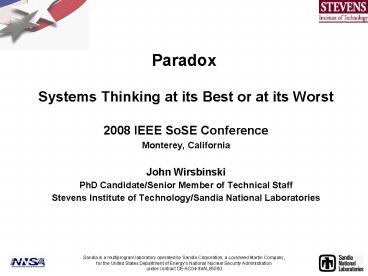Paradox - PowerPoint PPT Presentation
1 / 19
Title: Paradox
1
Paradox
- Systems Thinking at its Best or at its Worst
- 2008 IEEE SoSE Conference
- Monterey, California
- John Wirsbinski
- PhD Candidate/Senior Member of Technical Staff
- Stevens Institute of Technology/Sandia National
Laboratories
Sandia is a multiprogram laboratory operated by
Sandia Corporation, a Lockheed Martin
Company,for the United States Department of
Energys National Nuclear Security
Administration under contract DE-AC04-94AL85000.
2
Outline
- Introduction
- Soft Systems Methodology
- Analysis
- Conclusion
- Implications for SoSE
- Future Research
3
Introduction
- Motivation
- What is paradoxical thinking?
- Is paradoxical thinking really systems thinking
at its best? - Is paradoxical thinking useful as a systems
thinking method - As a problem Structuring and consensus tool?
- As a critical thinking tool?
- What are the implications for SoSE?
- Analysis Methods
- Soft Systems Methods
- Systemic Diagrams
4
Checklands Soft Systems Methodology
5
Boardmans Soft Systems Methodology
6
Paradox Definition
- A paradox is an apparent contradiction however
things are not always as they seem. A Paradox can
be explained, but only by seeking wisdom from
above for the systems guy this is to look up and
out, not just down and in. Paradoxical thinking
is systems thinking at its best.
7
Paradox Systemmigram
8
Checklands Soft Systems Methodology
9
First Root Definition of Paradoxical Thinking
- Consider a situation in which a person observes a
contradiction and attempts to resolve it within
the constraints of a system boundary. In
addition, the person is unconscious of the
system therefore, the persons thinking is
constrained by the system boundary. When the
contradiction cannot be resolved within the
bounds of the system, the person concludes that
the problem is irresolvable and declares the
contradiction a paradox. Under these
circumstances paradoxical thinking is a thought
process whereby a person views paradoxes as real
and irresolvable it is the antithesis of systems
thinking.
10
Systemmigram of Root Definition 1
11
2nd Root Definition of Paradoxical Thinking
- Consider a situation in which a person observes a
contradiction and attempts to resolve it within
the constraints of a system boundary. The person
is conscious of the system therefore, the person
can think inside or outside the system boundary.
When the contradiction cannot be resolved within
the system, the person recognizes the
contradiction is a paradox. The person then
applies the lessons of Kurt Gödel and seeks to
find resolution to the contradiction in a larger
system context. Thus paradoxical thinking uses
paradoxes as signals indicating a need for
expanding boundaries and thinking outside the
current system it is the epitome of systems
thinking.
12
Systemmigram of Root Definition 2
13
Checklands Soft Systems Methodology
14
Model Comparisons
15
Comparison Observations
- Model Comparison showed two distinguishing
features - The persons cognizance of the system
- The relationship between paradoxical thinking and
the system boundary
16
Is Paradoxical Thinking Systems Thinking at its
Best?
Paradoxical thinking is itself paradoxical in
nature
17
Implications for SoSE
- SoSE involves systems with multiple, independent
purposes - These purposes may be in conflict
- SoS purpose may rely on emergence to address
problems for which it was never designed - What does it mean to look upwards and outwards
for an SoS?
Paradoxical thinking may provide one framework
(view) for structuring the SoSE problem
18
Future Research
- Formally define Paradoxical Thinking
- What are the fundamental principles upon which
paradoxical thinking operates? - What are the steps of paradoxical thinking?
- How does one teach or demonstrate mastery of
paradoxical thinking? - What tools can be developed to help with the
recognition and resolution of paradoxes? - What is the time dependence of paradox?
- What is the spatial dependence of paradox?
- Can different architectural (e.g., temporal,
logical, etc.) views and representations be used
to resolve paradoxes? - Assuming that paradoxical thinking does not
require explicit cognizance of the system
boundaries, is this valuable in SoSE where it may
be impossible to precisely characterize the
boundary? - Koans as a metaphor for paradoxical thinking
19
Questions























![[PDF]❤️DOWNLOAD⚡️ Conservative but Not Republican: The Paradox of Party Identification and Ideol PowerPoint PPT Presentation](https://s3.amazonaws.com/images.powershow.com/10039593.th0.jpg?_=20240527036)



![[PDF]❤READ⚡ The Antitrust Paradox: A Policy at War With Itself Kindle Edition PowerPoint PPT Presentation](https://s3.amazonaws.com/images.powershow.com/10064640.th0.jpg?_=20240626079)


![Download Book [PDF] The Profit Paradox: How Thriving Firms Threaten the Future of Work PDF PowerPoint PPT Presentation](https://s3.amazonaws.com/images.powershow.com/10109879.th0.jpg?_=20240826125)
![PDF And: Making a Difference by Leveraging Polarity, Paradox or Dilemma, Volume [PDF] PowerPoint PPT Presentation](https://s3.amazonaws.com/images.powershow.com/10112277.th0.jpg?_=20240829086)